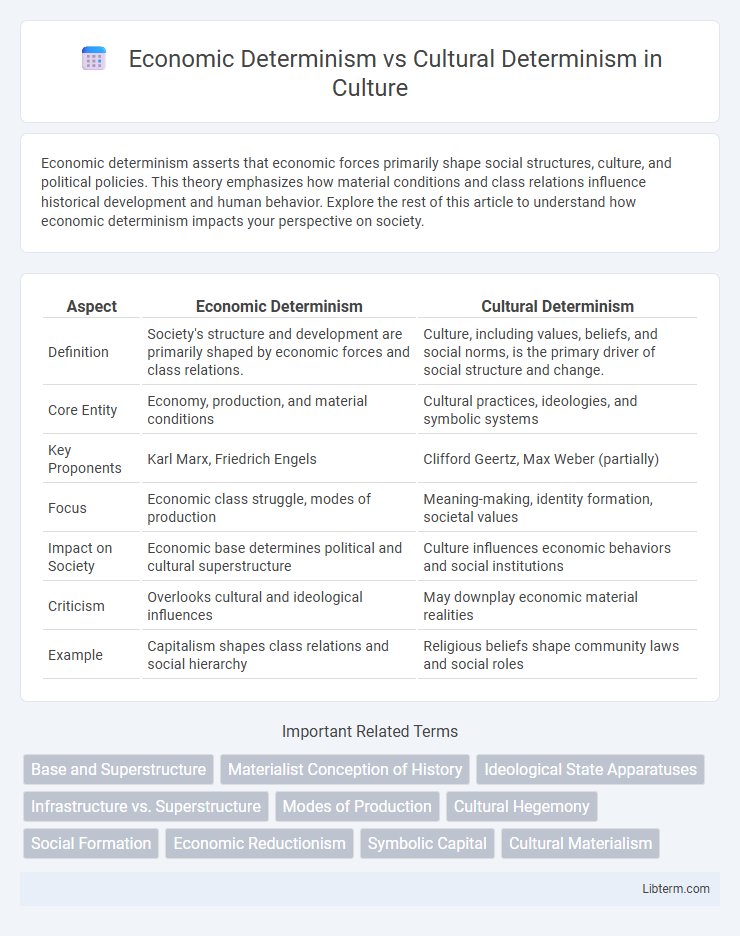Economic determinism asserts that economic forces primarily shape social structures, culture, and political policies. This theory emphasizes how material conditions and class relations influence historical development and human behavior. Explore the rest of this article to understand how economic determinism impacts your perspective on society.
Table of Comparison
| Aspect | Economic Determinism | Cultural Determinism |
|---|---|---|
| Definition | Society's structure and development are primarily shaped by economic forces and class relations. | Culture, including values, beliefs, and social norms, is the primary driver of social structure and change. |
| Core Entity | Economy, production, and material conditions | Cultural practices, ideologies, and symbolic systems |
| Key Proponents | Karl Marx, Friedrich Engels | Clifford Geertz, Max Weber (partially) |
| Focus | Economic class struggle, modes of production | Meaning-making, identity formation, societal values |
| Impact on Society | Economic base determines political and cultural superstructure | Culture influences economic behaviors and social institutions |
| Criticism | Overlooks cultural and ideological influences | May downplay economic material realities |
| Example | Capitalism shapes class relations and social hierarchy | Religious beliefs shape community laws and social roles |
Introduction to Economic and Cultural Determinism
Economic determinism asserts that economic structures and class relations primarily shape societal development, influencing politics, culture, and social ideologies. Cultural determinism argues that cultural values, beliefs, and practices drive social organization and historical changes independently of economic factors. Both theories offer distinct perspectives on the forces that underpin human behavior and societal evolution.
Defining Economic Determinism
Economic determinism posits that economic structures and class relations fundamentally shape society's institutions, culture, and political life. It asserts that material conditions, including modes of production and economic interests, drive historical and social development. This theory contrasts with cultural determinism, which emphasizes ideas, beliefs, and values as primary forces influencing social change.
Defining Cultural Determinism
Cultural determinism asserts that human behavior and societal development are primarily shaped by cultural values, beliefs, and traditions rather than economic factors. It emphasizes the role of language, religion, and social norms in influencing individual actions and collective outcomes. This theory contrasts with economic determinism by arguing that economic structures are secondary to cultural influences in determining social dynamics.
Historical Origins and Key Theorists
Economic determinism originated from Marxist theory, emphasizing the primacy of economic structures in shaping societal development, with Karl Marx and Friedrich Engels as key proponents. Cultural determinism, influenced by anthropologists like Franz Boas and sociologists such as Max Weber, argues that cultural values, beliefs, and social institutions primarily drive historical changes. These contrasting frameworks have deeply influenced debates in social sciences regarding the causality of historical evolution and social change.
Core Assumptions and Principles
Economic determinism asserts that economic forces and class relations fundamentally shape societal structure, culture, and human behavior, emphasizing the primacy of material conditions and production modes. Cultural determinism, in contrast, posits that cultural values, beliefs, and ideologies are the primary drivers of social organization and change, highlighting the influence of symbolic systems and meaning-making processes. Both frameworks offer distinct yet interrelated explanations for social dynamics, with economic determinism grounded in Marxist theory and cultural determinism drawing from anthropological and sociological perspectives.
Economic Determinism in Practice
Economic determinism in practice emphasizes the role of economic structures and class relations as the foundation shaping societal norms, politics, and cultural values. Historical materialism, as proposed by Karl Marx, illustrates how changes in the modes of production drive social transformation and influence ideological superstructures. Empirical studies of industrial capitalism reveal patterns where economic interests dictate legal systems, educational priorities, and cultural institutions, reinforcing the primacy of economic factors in societal development.
Cultural Determinism in Practice
Cultural determinism in practice emphasizes the profound influence of cultural values, beliefs, and norms in shaping social behavior and economic outcomes across societies. This approach argues that cultural frameworks guide individual and collective decision-making, often overriding purely economic incentives or material conditions. Empirical studies highlight how variations in work ethics, trust, and social capital embedded in culture significantly affect development trajectories and institutional effectiveness.
Comparative Analysis: Strengths and Weaknesses
Economic determinism emphasizes material conditions and economic factors as primary drivers of societal change, offering strong explanatory power for class struggles and capitalist development but often neglecting cultural influences and individual agency. Cultural determinism highlights the role of beliefs, norms, and values in shaping social behavior, providing insight into identity formation and symbolic systems while sometimes overlooking structural economic constraints. A comparative analysis reveals that integrating both perspectives yields a more comprehensive understanding of social dynamics, balancing economic structures with cultural meanings.
Modern Relevance and Intersections
Economic determinism underscores how material conditions and economic structures shape societal development and individual behavior, remaining relevant in analyzing global capitalism and income inequality. Cultural determinism highlights the role of beliefs, values, and symbols in influencing social dynamics, crucial for understanding identity politics and cultural globalization. Intersections between the two reveal how economic factors influence cultural practices and vice versa, evident in consumer culture and the commodification of cultural identities.
Conclusion: Bridging Economics and Culture
Economic determinism emphasizes material conditions and economic factors as primary drivers of societal change, while cultural determinism highlights the influence of beliefs, values, and social norms in shaping human behavior. Bridging economics and culture requires acknowledging their interdependence, where economic structures influence cultural practices and cultural values guide economic behavior. Integrating these perspectives enables a more comprehensive understanding of social dynamics and promotes interdisciplinary approaches to addressing complex societal challenges.
Economic Determinism Infographic

 libterm.com
libterm.com